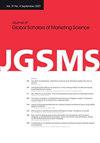Essential item purchases during COVID-19: A cluster analysis of psychographic traits
IF 2.7
Q3 BUSINESS
Journal of Global Scholars of Marketing Science
Pub Date : 2022-02-07
DOI:10.1080/21639159.2022.2033132
引用次数: 1
Abstract
ABSTRACT This research seeks to profile consumer segments formed during the COVID-19 pandemic via a set of psychographic consumption traits: Narcissism, Psychological Entitlement, Status Consumption, Fear of Embarrassment, and Fear of Missing Out. Based on a cluster analysis of 281 consumers, the data generated four distinct groups: Egalitarians, Agentic Egoists, Communal Egoists, and Conformists. Further, we compared the segments in their acquisition behavior as it pertains to importance of purchase, quantity of purchase, sharing of purchase, and willingness to pay for essential items. Our results showed that each cluster was associated with a unique set of consumer preferences. For instance, Egalitarians placed less importance on medical items. Conformists placed greater importance on acquiring disposable masks than others. Communal Egoists were interested in food-related items such as bottled waters and snacks. Agentic Egoists reported that they would spend more money on cold/cough medicines than Egalitarians and Conformists. Overall, our findings provide key insights and recommendations to retail managers. Some limitations include our sampling approach (i.e. US consumers) and determining clusters based on select psychographic traits. We acknowledge that there are other characteristics that can differentially influence consumers’ acquisition behavior during the pandemic.COVID-19期间基本物品购买:心理特征聚类分析
摘要本研究旨在通过一系列心理消费特征来描述新冠肺炎大流行期间形成的消费者群体:自恋、心理权利、地位消费、对尴尬的恐惧和对错过的恐惧。基于对281名消费者的聚类分析,数据产生了四个不同的群体:平等主义者、代理利己主义者、共同利己主义者和一致主义者。此外,我们比较了各细分市场的购买行为,因为它与购买的重要性、购买数量、购买份额和购买必需品的意愿有关。我们的研究结果表明,每个集群都与一组独特的消费者偏好相关。例如,平等主义者对医疗用品的重视程度较低。保形主义者比其他人更重视获得一次性口罩。社区利己主义者对瓶装水和零食等与食品相关的物品感兴趣。代理利己主义者报告说,他们在感冒/咳嗽药物上的花费比平等主义者和保形主义者更多。总的来说,我们的研究结果为零售经理提供了重要的见解和建议。一些局限性包括我们的抽样方法(即美国消费者)和基于选定的心理特征确定集群。我们承认,在疫情期间,还有其他特征会对消费者的购买行为产生不同的影响。
本文章由计算机程序翻译,如有差异,请以英文原文为准。
求助全文
约1分钟内获得全文
求助全文

 求助内容:
求助内容: 应助结果提醒方式:
应助结果提醒方式:


